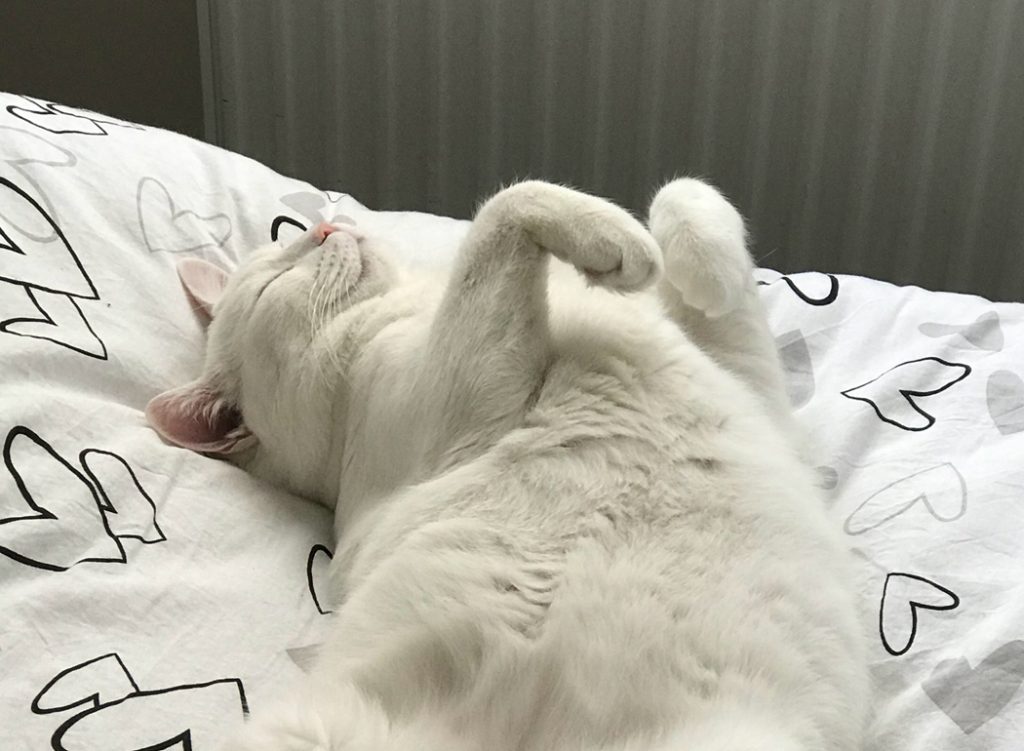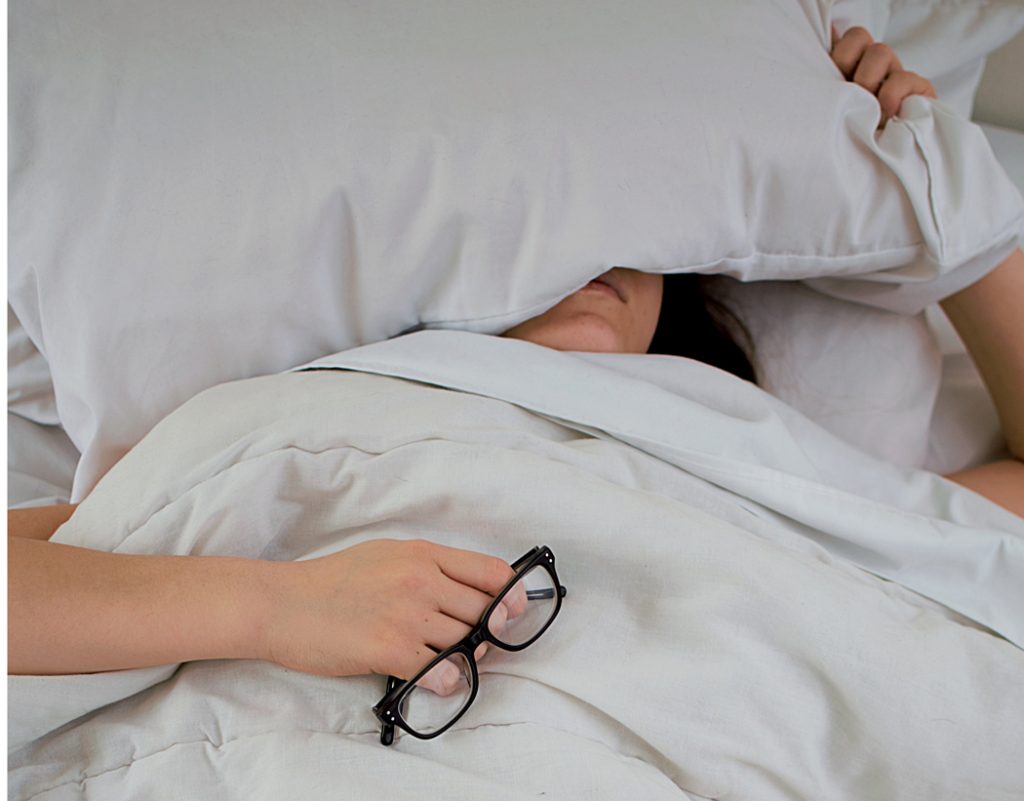
A delightful, helpful book about your sleep is The Sleep Solution: Why Your Sleep is Broken and How to Fix It by W. Chris Winter, M.D. His lifetime specialty is sleep. Dr. Winter tells us, as well as his patients who tell him they never or hardly ever sleep:
YOU SLEEP.
Say it out loud. Two words, six letters. Say it again, “I sleep.” Do you sleep well? Maybe or maybe not, but you do sleep. Say it, “I sleep.” Do you look at the clock every hour? Maybe or maybe not, but you do sleep. I cannot emphasize this point enough as it is usually the first law I have to establish with my new patients. If your sleep is a geometry class with lots of axioms, postulates, properties, and proofs, think of this as Law 1: You sleep.
Sleep is a complex subject. In recent decades, with new technologies available for research, we’ve learned that sleep is much more than just a deep, dark hole you drop into at bedtime, where everything stops until you wake up in the morning “fresh as a daisy!” Yes, you’re laughing, though some people actually do have that experience these days. And you can, too.
As a society, we’ve had it backwards. For, well, basically all of our history, we have relegated sleep to second place. Second place to late-night working, studying or playing, nightshift work, travel, even military service. Our public schools now start very early, so kids, who have a natural cycle of sleeping as many as nine hours, are forced to get up early and are likely becoming sleep deprived at a young age. They’re sleepy in school. Because we haven’t understood the extreme importance of sleep, we’re damaging our youth. Fortunately, there’s a pretty simple fix, which is: everybody get enough sleep.
Okay, if you have trouble sleeping, maybe it doesn’t feel so simple to get the hours you want and need. Let’s look at what sleep is.
Sleep Cycles
The three main sleep cycles are light sleep, REM sleep, and deep sleep.
Light sleep is the state between being fully conscious and then being in either REM sleep or deep sleep. Light sleep has two stages, N1 and N2. In most normal adults’ night sleep, about 5 percent is spent in N1 sleep. Your brain waves begin to slow down, eye movements become slow and rolling, and your muscle activity diminishes.
N2 sleep comprises almost half of your night’s sleep. REM sleep and deep sleep flow through the N2 sleep stage several times during the night, kind of like a gateway.
REM (rapid eye movement) is the sleep of dreams. As you dream, your eyes dart back and forth and your body is still. The REM cycles get longer as the night progresses, so the majority of deep sleep occurs during the first half of the night.
Deep sleep is about 25 percent of a normal adult’s night sleep. It’s a time of the slowest brain waves and the most restorative sleep, because the time you spend in deep sleep is the time of the greatest growth hormone production. Yes, growth hormone, GH, keeps being produced by your clever brain even when you’ve finished growing.
To quote Dr. Winter, “Simply make sure you value and protect your deep sleep at night and your brilliant brain will make all kinds of GH while you sleep, leading you to feel refreshed the following day. In addition, GH will help strengthen your muscles and fortify your bones, help you recover from injuries, and boost the functioning of your immune system.”
You can see that the suggestions below, like sleeping in darkness, seem to be largely meant to protect your deep sleep.
Sleep and Your Brain’s Neurotransmitters
I was surprised to learn that 90 percent of sleep takes place in the brain, mediated by chemicals known as neurotransmitters. Our brains process cycles of sleep and waking with the daily rising and falling of these chemicals. This ebb and flow creates the natural rhythm of our day, called the circadian rhythm, which gives us proper sleeping and waking.
Adenosine and melatonin, two core neurotransmitters, are produced by the brain every day and give us the circadian rhythm of waking and sleeping.
As well, recent research has discovered a system in the brain called the glymphatic system. The glymphatic system, active mostly during the night, clears toxins that have accumulated in your brain during the day. During the night hours, as you pass through the various phases of sleep, the glymphatic system works to clean up your brain.

From the time you wake up as the sun begins its daily passage through the sky, adenosine increases in your brain, giving you wakefulness. As the day wanes and darkness sets in, adenosine reduces and melatonin begins to increase.
Melatonin settles you down and you begin to feel sleepy, until you have just enough wakefulness to crawl into your lovely bed, in your very dark room with lights off. Pull the soft, clean sheets and warm or cool covers, depending on your body temperature needs, up to your chin, lie down on your side, head on your perfect pillow, maybe a small pillow between your knees. And zzzzz…

Dr. Winter says that with only a few adjustments, you can have this cleansing, refreshing sleep. Here are some specifics for you:
Numero uno for undisturbed sleep is no light. As in, lights off!! And keep them off. Sleep in utter darkness. Once melatonin has accumulated in your brain, light makes it go away, probably along with sleepiness.
Note: Dr. Winter advises going to bed when you actually feel sleepy. Then it’s easy to turn off your lights, screens, phone, TV, radio, and music, pull up the covers, and close your eyes. Because you’re sleepy.
If you can, turn off your house Wi-Fi at bedtime to lose the EMF waves filling your space. All this gives your brain and body the chance to really rest . . . in silence and darkness, as we are designed to do.
Insomnia Is Not a Disease
Fine, you’ve done all that, and then? Maybe you don’t go to sleep, or you wake up in the middle of the night and your mind starts churning. You’re not alone, but how you handle it makes all the difference for being rested. Anxiety and fear are the problem when we don’t sleep, not the wakefulness:
Dr. Winter says, “For me, I feel that insomnia is really about one thing: Fear.” Fear and anxiety: Your mind starts churning: l’ll be a mess tomorrow if I can’t sleep for my full seven hours! Is this going to go on for the rest of my life?
Even if you don’t think of yourself as having insomnia, not being able to go back to sleep probably brings a bit of worry, a little concern. Why can’t I go back to sleep?
Sleep specialists are now understanding that, in the hours you may not be sleeping, just easily resting can refresh you. Enjoy this peaceful time. The trick is to make the choice to not care. You likely are getting periods of sleep (see above). Accept that and be easy. Calm, settled thinking lets your mind relax. For example, recreate the steps for making the blender eggs Benedict everyone loves, or replay a blissfully fulfilling pickleball game. Your brain will think you really are doing it and settle down.
Dr. Winter says, “When you talk with good sleepers, they all have a flip-flops-and-Hacky-Sack mentality towards their sleep. ‘Whatever, dude.’ Within them is an inner belief that they are basically going to be okay no matter what happens that night in bed. This is the mentality you must find, or you will be doomed to struggle forever.” Apparently, the difference is that they don’t care if they don’t sleep.
Recently, when I’ve woken up at 3 or 4 a.m., taking the advice to be easy, lying comfortably with my eyes closed, I’ve come upon big, cosmic revelations and little problem-solving ideas. One little idea solved my need to check the time without turning on any lights, which I believed (not feared) would chase away my brain’s supply of sleep-inducing melatonin and for sure disallow going back to sleep.
So that’s how it works. You can choose. Know you’ll be functional and choose not to worry. You can choose to enjoy the gift of free time in the sweet darkness. It might take some practice, and that’s okay, too.
Caffeine, Alcohol, Nicotine, and Your Sleep
(Hey, I’m just the mail person.)
There’s a reason for our planet-wide addiction to daily caffeine drinks. We’re alert and happy . . . for a while.
On the other hand, caffeine can damage our adrenal glands and, over time, our sleep. One study found that caffeine drinks consumed six hours before bedtime reduced sleep by one hour. An hour you don’t want to lose.
Nicotine and alcohol may also worsen your sleep over time. Using alcohol as a sedative can help put you to sleep, but then it may mess up the deep sleep periods, which your brain and body need.
What about pharmaceutical sleep aids? They can have good and sometimes not so good effects. Dr. Winter has a chapter in his book if you want know more.
The Keys to Good Sleep
That’s it for now.
I hope these basics help you get the sleep you desire and deserve. Just remember, darkness and being easy on yourself are the keys to help you sleep. And, oh yes, no alcohol or caffeine late in the day.
Sleep well.
In Fairfield, you can find The Sleep Solution by Dr. Chris Winter at Revs Health Center.
